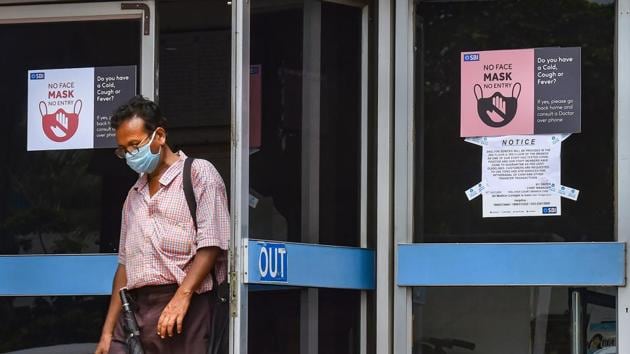Covid-19 pandemic: No need for panic over research of coronavirus being airborne, wear mask for longer, says expert
People need not panic over new research findings that coronavirus is airborne as studies cited by a group of over 200 scientists only convey it can be ‘atleast temporarily’ in air and does not mean the pathogen is flying all over and will infect everyone, an expert has said.
People need not panic over new research findings that coronavirus is airborne as studies cited by a group of over 200 scientists only convey it can be ‘atleast temporarily’ in air and does not mean the pathogen is flying all over and will infect everyone, an expert has said.

This meant, people should wear mask for a longer period of time and continue to take other precautions such as social distancing to keep off the virus, Director of the CSIR-Centre for Cellular and Molecular Biology (CCMB) here Rakesh Mishra said.
The letter of 239 scientists to the World Health Organisation (WHO) saying there was evidence that the coronavirus is airborne was based on two research papers, he said.
“Those are good studies. Based on that, what is being communicated to WHO is that the virus can be at least temporarily airborne, which means it can travel in droplets of smaller size less than five micron which will mean that it will be hanging in the air for longer than bigger droplet which settles down in a few minutes,” he told PTI.
It meant, small droplets released when a person speaks or breathes would be in the air for some time.
Hence, people have to wear a mask for a longer period of time, even if a person has left (a room) or when they go to a place, as someone there may have been potentially infected, he said.
“But, at the moment, there will not be, as far as I see, any major change in guidelines except a few modifications like this and there is no particular need to be stressed or panic that the virus is flying all over the place and it will be infecting everyone,” Mishra said.
According to a report in New York Times,the 239 scientists from 32 nations have written to the WHO, saying there is evidence that coronavirus is airborne and even smaller particles can infect people, a significant departure from the UN health agency’s claim so far that COVID-19 is spread primarily through coughs and sneezes.
In an open letter to the WHO, the scientists have outlined the evidence showing that smaller particles can infect people, and are calling for the agency to revise its recommendations.
The WHO has long held that the coronavirus is spread primarily by large respiratory droplets when an infected person coughs or sneezes.Mishra said the research findings were good as they would help in evolving more ways to plan and protect against the virus. He felt WHO would take note of the research findings sent to it by the scientists. The mechanism of the virus is still similar except that it will hang for a little longer time in the air.
“Otherwise, there is no major change that has to come (in precautions),” he said. People should take the same precautions, including maintaining physical distance and avoiding rooms where multiple people are present, particularly those lacking aeration such as AC rooms, the scientist said, adding gathering in a closed space should be avoided strictly. They can continue to take the same precautions, but masks should be worn for a longer time, he said.
He also observed that it was too early to say that enough had been known about the virus. It was only six months old, and that a lot more needed to be learnt, including about what it does after infecting a person. Such knowledge would help in treating patients, he said. “I would say we have made tremendous progress but lots of things need to be still figured out,” he added.
(This story has been published from a wire agency feed without modifications to the text. Only the headline has been changed.)
Catch your daily dose of Fashion, Health, Festivals, Travel, Relationship, Recipe and all the other Latest Lifestyle News on Hindustan Times Website and APPs.



